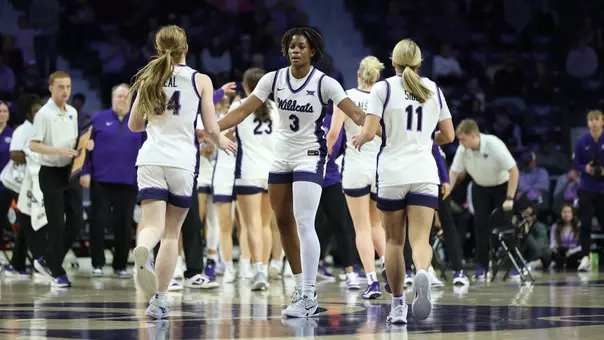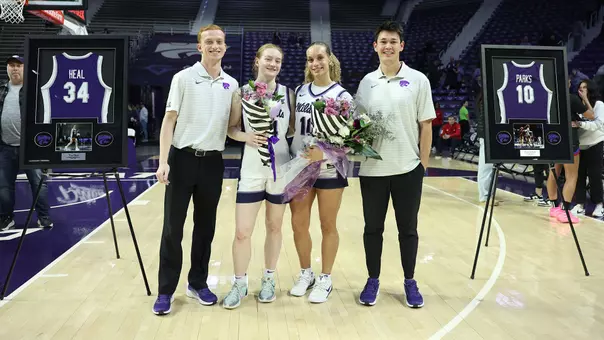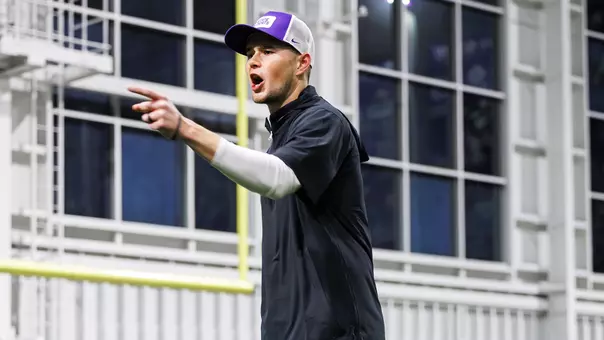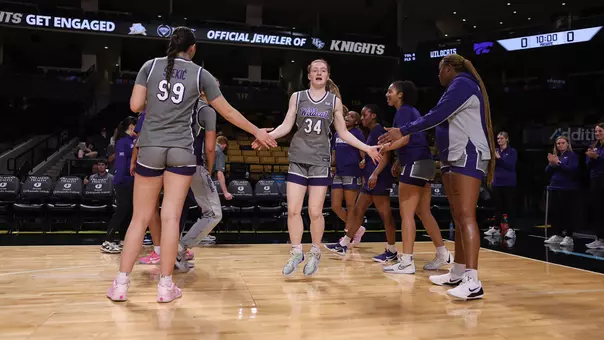
In Her Own Words: A Survival Guide to Being a Two-Sport Student-Athlete
Nov 14, 2019 | Women's Basketball, Volleyball, Sports Extra
By Peyton Williams
It was my stepdad’s idea, originally. The whole two-sport thing. The conversation occurred during an impromptu kitchen meet-up during the winter of my junior year of high school. I was sifting through the mail, pulling out the recruiting letters and piling them on the counter — my after-school ritual those days.
My dad stopped on his way back from refilling his water, watching the process. I pulled a telltale purple envelope from the pile.
“Which sport is it from?” Dad asked over my shoulder. I showed him the picture. It was from the Kansas State women’s basketball team, wishing me a happy holiday season. He hid a smile as he sipped from his K-State football emblazoned cup.
“If I choose K-State,” I said, stressing the “if” and side-eyeing him, “how am I gonna choose which sport to play?” He raised his eyebrows, beginning to shrug. But then he stopped, shoulders slightly raised, a thought appearing to occur to him.
“Have you ever thought about playing both?” he said, instead.
I frowned. I hadn’t.
“Would they even do that?”
“I don’t know,” he said, finishing that shrug after all. “It’s worth an ask.”
We both stood there, him sipping his water and me fiddling with the envelope, thinking. Then both of us grinned, giggled even.
“That’d be crazy,” I said, shaking my head.
It turns out, many people would agree with high-school-me.
If I received a dollar for every time someone called me crazy when I told them I play basketball and volleyball at the Division 1 level, I could use the money to put a down payment on a small beach house.
Two sports that overlap as much as those do? Absolutely not.
While being a good student? No way.
In the words of a former trainer, aggressively taping my ankles my freshman year, “It’s physically impossible to do both volleyball and basketball. You won’t make it through college doing both.”
Aka: You’re crazy.
Well, in the words of Serena Williams in a recent Nike ad, “If they wanna call you crazy, fine. Show them what crazy can do.”
So, I did.
And it’s been more than I ever imagined.
Fortunately for me, my career thus far has been a bright one. I’ve scored lots of points, rebounded a bunch of basketballs, and hit volleyballs at a decent clip. I’ve had the opportunity to travel to Europe and South America to compete and even had the privilege of representing Team USA. A few people from our communications department even created an awesome website detailing my time at K-State (unreal, right?).
But, more importantly, I’ve been able to contribute on two wonderful teams and play for some of the best fans in the country.
Throughout everything, people want to know what my experience has been like. They want to know how hectic the seasons of overlap get, how I stay connected to both teams, how I manage to balance everything.
Up until now, I think my answers have been a bit insufficient.
Describing the times of overlap can be like describing an unfamiliar movie scene being played on fast forward: you can kinda summarize the general sense of it, but the details are mostly blurry.
However, as I’ve entered my last year of doing the two-sport thing, questions posed to me have been geared toward reflection, forcing me to really slow down the tape and watch it back.
So, I’ve thought about what it has taken to get where I am today and what I would suggest for someone trying to do the same thing.
I’ve comprised a list of five major things, a survival guide for the dual-sport athlete:

1) Secure A Way to Get from Here to There
Many a time have I stepped outside of myself during my college career and thought something similar to Will Smith’s character, Chris Gardner, in “The Pursuit of Happyness.”
This part of my life, this part here, is called ‘Running.’-Will Smith, "The Pursuit of Happyness.'"
As a dual-sport athlete, you will often find yourself booking it from place to place. Whether it’s a full court sprint, a jog from practice to practice or a brisk walk from your car parked out in the boonies to your first class of the day, you’re frequently on the move. You won’t spend every day in this feverish state, but when you do, it’s imperative that you are able to get where you need to go in a timely manner.
You always need to know how you’re going to get from here to there.
I used to drive a silver, 2007 Chevy Equinox named Linda. She was both car and closet, sturdy and spacious, a surprise gift from my high school grad party. But Linda was somewhat finicky. She was cumbersome, especially obstinate on cold mornings, and often demanded trips to the repair shop to have work done. For these reasons, and due to her untimely demise last fall (rest in pieces, my dear), I often had to figure out other ways to get where I needed to go.
Basically, in terms of a vehicle, having a car won’t always cut it. Lord knows when you are going to come out post-game to a deflated tire or get in a fender bender that leaves you without a set of wheels at all.
Adaptability will become one of your greatest assets as an athlete.
Sometimes, you’ll need to bum a ride from a teammate or a roommate. Maybe you’ll need to borrow a bike. Perhaps you’ll just have to lace up a pair of comfortable shoes and take a hike. The world may understand when life gives you lemons, but it’s not going to sit and watch you make lemonade.
So, you might as well get moving.


2) Stay (Somewhat) Organized
All student-athletes can agree that sometimes the most consistent thing about your schedule is its inconsistency.
Practice schedules fluctuate, flights get delayed, recruits suddenly come into town. Plans can change from week to week and even day by day. This can be frustrating, especially if you have a planning personality or are stressed by sudden change. However, though your schedule can often feel out of your control, there are ways to keep your life somewhat organized.
First and foremost, I’d recommend writing out your monthly schedule. Get a planner or maybe one of those big, paper calendars you can hang on the wall.
However, since this is the digital age, let’s talk about a few technological essentials that will help you plan your life and keep you in the know.
The first is group chats. There are several kinds of chats, some between teams and coaching/training staff, some only amongst players, and others connecting you with classes and group projects on campus.
As a dual-sport athlete, being part of these group chats year-round can feel like attending a perpetual office dinner party: It’s important to show your support for the program and to listen when execs give toasts, but, all in all, it’s a lot of chatter, only half of it relevant to you, and you’ll often want to just politely excuse yourself. But, even when it feels like a lot, group chats are a necessity. It will allow you to chime in on group decisions and will keep you in the loop.
The second essential item was introduced my sophomore year: Teamworks.
Teamworks is a scheduling app that keeps track of your school, practice and game schedules as well as mandatory and “highly suggested” activities related to athletics. It helps keep both coaches and players accountable, and you’ll need to check it multiple times a day.
However, Teamworks will only get you so far. The app isn’t built to accommodate two different sports, not to mention two very conflicting schedules. And where technology fails you, you need people to help you fill the gaps.
There are certain people who help you plan out your calendar and organize your time. The primaries are the good people of Compliance. They set the parameters of your time and help you guard it, something I’ve been very thankful for.
As far as what constitutes your calendar, that is the tricky part. It became clear very quickly that my schedule could not be decided upon between the two coaching staffs. Mostly, they agree to disagree, which makes sense; you don’t want your coaches to compromise on anything less than what they think would be best for the team.
That’s why you’ll need a mediator, which in my case turned out to be Jill Shields, Deputy AD and Senior Woman Administrator. Jill and I sit down about three or four times a year and talk about what my days are going to look like. We talk about which sport will take priority during certain months, which practices and games can be made and missed.
You’ll need a mediator who is smart, a good listener, and strong enough to handle the wrath of two head coaches, if need be. Go out and find yourself someone like Jill (though doing so will be hard to do).

3) Find an Anchor
Ever since I was little, I was prone to explore. Not in the Dora kind of way, but more like Han Solo in the Millennium Falcon or a hobbit across Middle Earth.
My adventures took me anywhere from the woods out back to a galaxy far, far away. My affinity to discover worlds beyond my own has led me to Anthropology and International Studies, inspiring my love for travel and experiencing the beauty of other cultures and countries. Some of my best memories from college include wandering the historic streets of Rome or running along the beach in Rio.
However, most of college athletics is not spent taking in breathtaking views in exotic locales.
Typically, while your friends are off on their spring break or decking the halls, you’re taking in the familiar views of Manhattan, Kansas, or viewing yet another delightfully vague picture hanging in a hotel room.
If you’re an explorer like me, you get fidgety in this situation. Athletics begins to feel less like the wind beneath your wings and more like the tether to your hot air balloon.
The trick here, as I’ve learned, is to shift your perspective. The trick is not focusing on the places you cannot go (yet) but working to find and understand the things that will keep you anchored in the now.
The fundamental thing that has kept me where my feet are is my faith. Or perhaps, more accurately, God’s faithfulness to me.
Being a dual-sport athlete has brought me more success than I could have hoped for, more notoriety and opportunity than I could have ever imagined. In the same breath, being a dual-sport athlete has also made me confront my personal failings two times over and has stretched me in more ways than I thought possible.
Know that if you get into this gig, there will be several times when you’ll want to just run away and leave it all behind you. But, in these times, I have known that God is good, and, in the midst of chaos, Jesus calms the storm. In the waves of success and shortcomings alike, I can rest in the fact that I am loved and forgiven, and it has allowed me to play the sports that I love with less fear and greater freedom.
If believing in God isn’t your thing, find your thing. Do some work within and figure out what, in the midst of the tempest, will remind you of who you truly are and why you’re here. For me, I’m simply giving credit where credit is due. (And if you’re ever in need of some unconditional grace and love, let me know. I know a guy.)
With a substantial bedrock established, there are also a few little things you can do to keep you tied to the present.
Find out what things recharge your batteries and set aside time to do those things. At first, focus on what you can do by yourself to recharge so your wellbeing doesn’t need to rely on other people.
For me, some of these things include watching an episode of Parks and Rec over dinner, learning a new song on my guitar, or carving out some time to read a book for my own enjoyment. (I’m an introvert, so most of my time is spent doing such things.)
Then, leave room to spend intentional time with people.
One of the hardest things to do when playing two sports is making sure you are staying connected to both teams. I have worried about not having enough time to truly invest in my teammates, to make them feel like I truly care about them before I try to lead them.
This kind of thinking was immobilizing because I couldn’t see the trees for the forest. That’s when I realized that you can’t love everybody without first loving someone. So, a recent mantra of mine became “Make someone feel loved today.”
Each day, focus on someone on your team, listen to them, build them up. Take them to coffee or maybe just ask how their day was. Time isn’t something you’ll have a lot of, but time being loved and loving someone else is always time well spent.

4) Develop a Sense of Humor
One of the biggest things I’ve learned is that life is a lot sillier than most people give it credit for.
There are some serious things, of course, like death and pain, but even some of the things we consider to be serious are in fact quite trivial. Basketball is merely a complex version of throwing paper wads into the trash can. Volleyball is simply a more difficult version of “don’t let the balloon touch the ground.”
And these are the two things that occupy most of my time… lol.
Basically, we can make life much more complex and frustrating than it really needs to be. In basketball meetings we talk a lot about a particular phrase: “Control what you can control.” After several conversations about it, it has become clear that, although we like to think we can control lots of things, the only thing we can truly control is ourselves.
We can control our mindset, our effort, our attitude. That’s it.
Well, if the one thing I can control is my own attitude and actions, I think I’ll choose to be laughing, thank you very much. Several studies link laughter to various health benefits, including reducing stress and lengthening your life. Many praise laughter for tightening social relationships and increasing group cooperation. Some research has even found that the most effective leaders were funny.
Laughter makes life easier, plain and simple.
As a dual-sport athlete, you’re going to learn how many things are beyond your control.
You’ll learn that 80% of the time, whether it be from sweat or your most recent shower, your hair is going to be wet. You’ll discover that during two-a-days, your face is going to defy the efforts of any “deep cleansing” face wash.
You’re going to learn what failure feels like. Many, many times. You’ll have bad games, you’ll forget about early morning weights, you’ll treat someone poorly, you’ll bomb a test you studied for extensively.
The moment will come when you’ll blow it, and it’ll stink big time. You’ll apologize. You’ll feel terrible.
But then that moment will pass, and all you can do is learn from it and move on, with a good chuckle at your own expense.

5) Gratitude. Always Gratitude.
As people continually comment on the time commitment and the “grind” of the athletic lifestyle, it is very easy and accepted for student-athletes to complain.
You’re tired most of the time, your body hurts, you feel like you can’t get a break. It’s easy to get caught up in how hard your life is. But, as everyone knows but hates to admit, complaining does nothing for you.
If anything, it makes your experience worse.
Struggle is part of the process of anything worthwhile and the sooner you can accept that, the more manageable your life will be. However, it’s way harder to break a habit than it is to create a new habit. So, instead of getting all in a dither about your difficulties, take the time to reflect on your blessings.
As a dual-sport athlete, you get to do a lot of things not everyone gets to do.
I get to play two college sports when thousands of kids across the U.S. would kill to play just one. I receive clothing and shoes for free. I’m allowed to go to school when millions of other girls around the world do not. I have access to good food, clean water, and a safe place to stay and work.
Struggle is part of the process of anything worthwhile.
Sure, my life can feel like living in the middle of a tornado at times, but it’s a good life. Understand that you are living someone else’s dream. Don’t take that for granted and never take for granted the people who help you live out that dream.
There’s an African proverb that says, “It takes a village to raise a child.”
If it hasn’t become obvious thus far, it takes a lot of people to help me do what I do. It takes coaches, trainers, strength coaches, directors of ops, video coordinators, compliance folks, ADs and Deputy ADs, heads of communications, photo/videographers, announcers, nutritionists, massage therapists, advisors, professors, bus drivers, pilots, janitors, teammates, friends and family.
And that’s just the short list!
Being a dual-sport athlete doesn’t just require you to do more, but everyone else as well. It requires strength coaches to collaborate on workouts, trainers to communicate about aches and pains. It requires the patience of coaches and the vigilance of compliance workers. It requires people to tell your story and to encourage you along the way.
So, thank you to all of those people who have helped me through this process. You’ve shaped my experience into more than I could have ever hoped for, and I’m so very thankful for you all.
As Elizabeth Gilbert writes in her book Big Magic: “... it’s all kind of amazing — what we get to do, what we get to attempt, what we sometimes get to commune with. Gratitude always. Always, gratitude.”
In the moments when it gets tough and you feel alone, remember all of the people who are working steadily alongside you to help you pull this thing off. That’s why a lot of those folks are given the title “support staff.” They’re there to brace you and guide you as you do your best. Learn to ask for help when you need it and when it is given, respond with gratitude, always.
Always, gratitude.
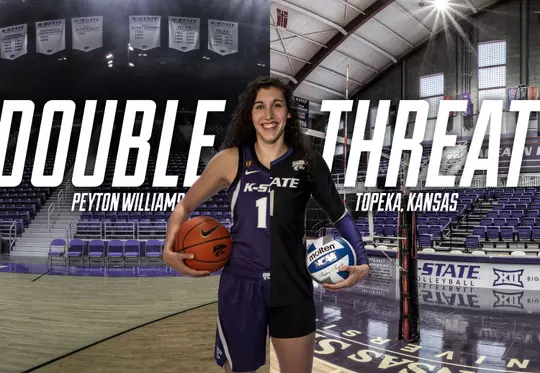
I realize that most everyone reading this won’t go on to be Division 1, dual-sport athletes. I recognize many of you won’t get to play under the lights at Bramlage Coliseum or compete in the electric atmosphere at Ahearn Field House.
But you do know what it’s like to have passions that fill both your soul and your weekly planner. You know joy and success, frustration and failure. You know that some of the best things in life are also sometimes the hardest.
My advice, if I’m in any place to give it, remains the same: keep moving, organize your mess, stay grounded, laugh often, and always, always respond with gratitude.
Consider it a survival guide from one crazy, fortunate dual-sport athlete.














































